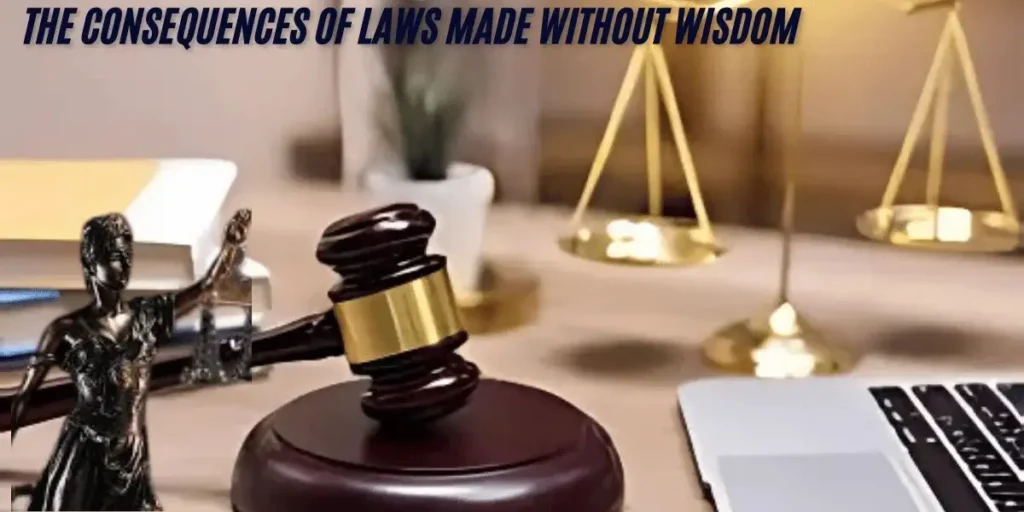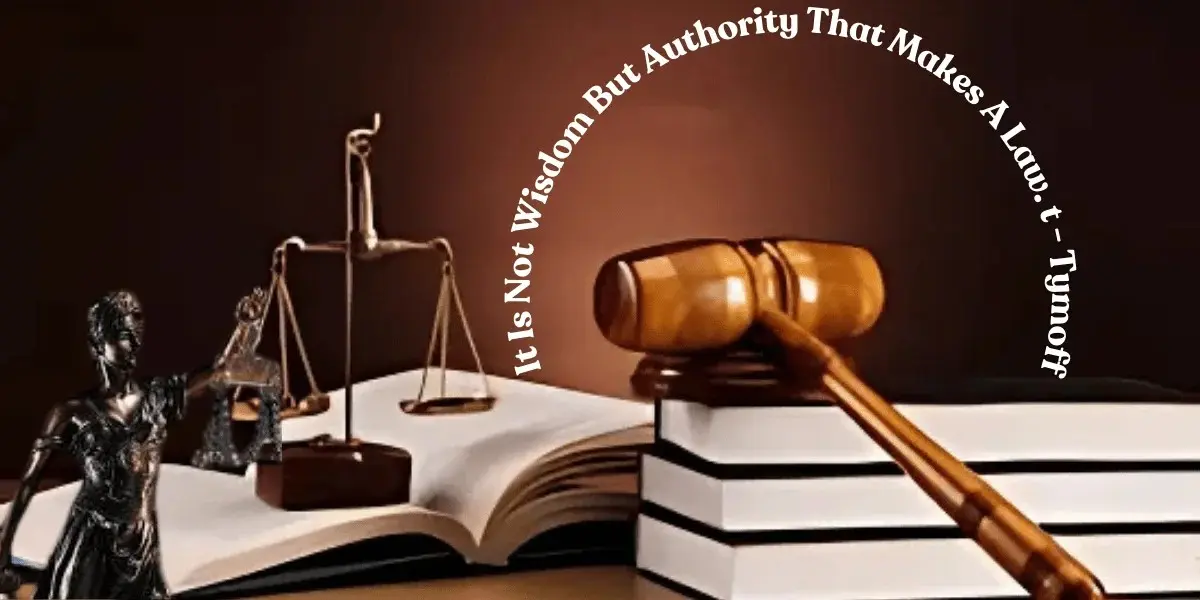The famous quote by It Is Not Wisdom But Authority That Makes A Law. t – Tymoff” touches on a profound concept about the nature of laws, authority, and the role of wisdom in legislation. This statement reflects the philosophical and political discourse regarding the legitimacy of laws and how they come into existence. At its core, Tymoff’s quote challenges the traditional belief that laws are born out of wisdom and reason. Instead, it suggests that authority, not wisdom, is the ultimate factor in the creation and enforcement of laws. In this article, we will explore the meaning of this statement, its implications, and how it relates to modern governance and legal systems.
Understanding the Quote: What Does It Mean?
To truly grasp the essence of Tymoff’s quote, it is important to break it down. The phrase “It Is Not Wisdom But Authority That Makes A Law. t – Tymoff” suggests that laws do not necessarily emerge from wise counsel or thoughtful deliberation, but rather from the power and authority of those who create them. In this context, the “wisdom” represents knowledge, reason, and justice—qualities often associated with the creation of laws that serve the greater good. “Authority,” on the other hand, refers to the power or influence wielded by lawmakers, rulers, or institutions that hold the power to establish and enforce laws, regardless of their wisdom or fairness.
In a more traditional sense, many people believe that laws should be the result of careful reasoning, fairness, and wisdom to ensure they are just and serve the common good. However, Tymoff’s quote asserts that authority is what determines whether something becomes a law, regardless of its inherent wisdom. This shifts the focus from an idealistic view of lawmaking to a more pragmatic, power-driven perspective.
Also read: Constitution Day of India | Connections Hints | BlueSkyPerezTechCrunch | ww55.affinity.net
The Role of Authority in Lawmaking
To understand how authority shapes laws, it is important to explore the role of various entities in the lawmaking process. Laws are often created by governments or institutions that hold legislative, executive, and judicial powers. These entities, whether it be parliaments, congresses, monarchs, or courts, possess the legal authority to pass, enforce, and interpret laws. The authority they hold allows them to make laws that influence the daily lives of individuals, regardless of whether the laws are seen as wise or just by the public.
In many cases, laws are created through a process of political negotiation, with lawmakers or leaders using their authority to push through legislation that serves their interests or those of the ruling party. The motives behind these laws may not always align with wisdom or justice but are often influenced by political power, social pressures, or the interests of influential groups. This highlights how authority, rather than wisdom, can be the driving force behind the creation of laws.
Authority vs. Wisdom in Lawmaking: A Historical Perspective
Throughout history, the tension between authority and wisdom has been a recurring theme in the development of legal systems. In ancient civilizations, such as in Mesopotamia, Egypt, and Greece, laws were often seen as decrees from rulers or gods. These laws were not necessarily created based on rational deliberation or wisdom, but rather on the perceived authority of the ruler or divine being. The authority of kings, emperors, or priests was sufficient to impose laws upon the people, whether those laws were wise or not.
One notable historical example is the Code of Hammurabi, one of the earliest and most famous legal codes, which was issued by King Hammurabi of Babylon in the 18th century BCE. The code was presented as a divine mandate, with Hammurabi claiming to have received his authority from the gods. While the code did include provisions for justice, it was the king’s authority, not wisdom, that ultimately gave the laws their legitimacy. The emphasis was on power and authority rather than the philosophical or ethical wisdom behind the rules.
Similarly, in the Middle Ages, European monarchs wielded absolute power over their subjects, often passing laws based on their personal authority or religious decree rather than reason or justice. The divine right of kings, which held that monarchs derived their authority directly from God, allowed rulers to enact laws without any democratic input or consideration of wisdom. In these cases, laws were based on authority, with little regard for the rationale behind them.
The Modern Implications of “It Is Not Wisdom But Authority That Makes A Law”
In contemporary society, Tymoff’s quote continues to resonate, especially when analyzing how laws are created and enforced in democratic systems. While modern democratic systems emphasize the importance of reason, fairness, and wisdom in the creation of laws, authority still plays a central role in the lawmaking process. Legislators, elected officials, and even unelected bureaucrats often have the power to create laws that may not always reflect the public’s wisdom or needs, but rather the political power or authority they hold.
For example, when a law is passed by a legislative body, it is based on the authority granted to those elected representatives by the people, rather than the actual wisdom of the law itself. The legislative process often involves negotiation and compromise, where power dynamics between different interest groups or political parties shape the final law. Even if a law is deemed wise or just, it is ultimately the authority of those in power that allows it to become an enforceable rule.
In modern legal systems, judicial bodies also hold significant authority in interpreting and enforcing laws. Courts have the power to determine how laws are applied in specific cases, which can lead to disparities in the way justice is administered. Judges may use their authority to interpret laws in a way that serves political or social agendas, even if those interpretations are not necessarily grounded in wisdom or fairness.
The Nature of Law
The nature of law is a fundamental concept in legal philosophy, referring to the characteristics, purpose, and sources of law. Law serves as a system of rules created and enforced by governing authorities to regulate behavior, maintain order, and ensure justice. It is shaped by cultural, social, and political factors and evolves over time. Laws are typically enforced by governmental institutions, such as courts and law enforcement agencies, to ensure compliance and protect individual rights.
The Consequences of Laws Made Without Wisdom

When laws are enacted based solely on authority and not wisdom, there can be negative consequences for society. Laws that are not based on reason or justice may lead to injustices, inequality, and a lack of public trust in the legal system. For instance, oppressive regimes often use their authority to pass laws that benefit the ruling class or suppress dissent, without considering the broader welfare of the population.
In democratic societies, laws passed through the exercise of political authority, but without proper deliberation or wisdom, can lead to the creation of ineffective or harmful policies. For example, laws that cater to special interest groups or political donors may be enacted without considering the long-term social and economic impacts. This can lead to inequality, economic instability, and public dissatisfaction with the legal system.
Also read: Modern Mullet | Dreamplay1 Login | Free Anime Websites | Your Topics Multiple Stories
Modern Legal Systems of Law and Authority
- Separation of Powers
Modern legal systems typically involve a clear separation of powers among the legislative, executive, and judicial branches of government. This division ensures that no single entity holds absolute authority, and each branch has checks and balances on the others. Legislators make laws, executives enforce them, and courts interpret them. - Democratic Lawmaking
In democratic systems, the authority to create laws comes from elected representatives. These lawmakers derive their legitimacy from the consent of the governed, and their decisions are ideally informed by public opinion, expert advice, and ethical considerations. However, the process remains driven by political authority rather than pure wisdom. - Rule of Law
Modern legal systems emphasize the rule of law, meaning that laws apply equally to all individuals, regardless of their status or authority. This principle aims to prevent abuses of power and ensure justice, but it relies on the authority of the legal system to be effectively enforced. - Judicial Review
Judicial review allows courts to assess the constitutionality and legality of laws. This gives the judiciary a critical role in maintaining the balance between legislative authority and wisdom, ensuring laws are not only legal but also just. - International Law
Modern legal systems also incorporate international law, recognizing that authority extends beyond national borders. Treaties, conventions, and international courts play a role in shaping global legal standards, creating a broader framework of authority.
| Country | Rule of Law Index (2023) | Law Enforcement Effectiveness (%) | Notes |
|---|---|---|---|
| Denmark | 0.89 | 92 | High trust in the legal system, robust enforcement |
| United States | 0.74 | 80 | Strong judiciary, but varied enforcement |
| China | 0.48 | 85 | Authoritarian enforcement, limited legal recourse |
| Nigeria | 0.36 | 45 | Weak legal system, corruption issues |
Striving for Both Authority and Wisdom in Lawmaking
While Tymoff’s quote emphasizes the role of authority in creating laws, it is important to consider the ideal balance between authority and wisdom in lawmaking. In democratic systems, the best laws are those that are created through a combination of legitimate authority and thoughtful deliberation. While authority is necessary for enforcing laws, wisdom ensures that those laws are fair, just, and effective in achieving their intended goals.
To achieve this balance, lawmaking processes should prioritize public input, expert opinions, and ethical considerations in addition to the authority of lawmakers. Engaging in thoughtful debate and considering the long-term consequences of laws can help ensure that the laws created serve the public interest and are based on reason, not just power.
Conclusion: The Complexity of Lawmaking
It Is Not Wisdom But Authority That Makes A Law. t – Tymoff” offers a thought-provoking perspective on the nature of law and its creation. It reminds us that the power to create and enforce laws lies with those who hold authority, but the wisdom behind those laws is just as important in ensuring they are just and beneficial for society. While authority will always be a central component in the lawmaking process, we must strive to ensure that wisdom and fairness guide the creation of laws, so they serve the common good and promote justice. By balancing authority with wisdom, we can create laws that are both effective and morally sound.
FAQ: It Is Not Wisdom But Authority That Makes A Law. t – Tymoff
1. What does Law Enforcement Effectiveness refer to?
Law Enforcement Effectiveness refers to the ability of a country’s law enforcement agencies to maintain public order, enforce laws, and ensure compliance. A higher percentage indicates more efficient and widespread enforcement.
2. Why does Denmark score high on the Rule of Law Index?
Denmark’s high score of 0.89 reflects its robust legal system, high trust in institutions, and consistent law enforcement. The country has strong institutions that protect individual rights and maintain social order effectively.
3. How does China’s legal system differ from Denmark or the United States?
China has an authoritarian legal system, where the government has more control over the legal process, limiting legal recourse for citizens. Despite a high Law Enforcement Effectiveness score (85%), the Rule of Law Index is low (0.48) due to limited judicial independence and political freedoms.
4. What challenges does Nigeria face in law enforcement?
Nigeria’s legal system struggles with weak enforcement, widespread corruption, and a lack of trust in institutions, reflected in a low Law Enforcement Effectiveness score (45%) and the low Rule of Law Index score (0.36). These issues hinder effective justice and public safety.



